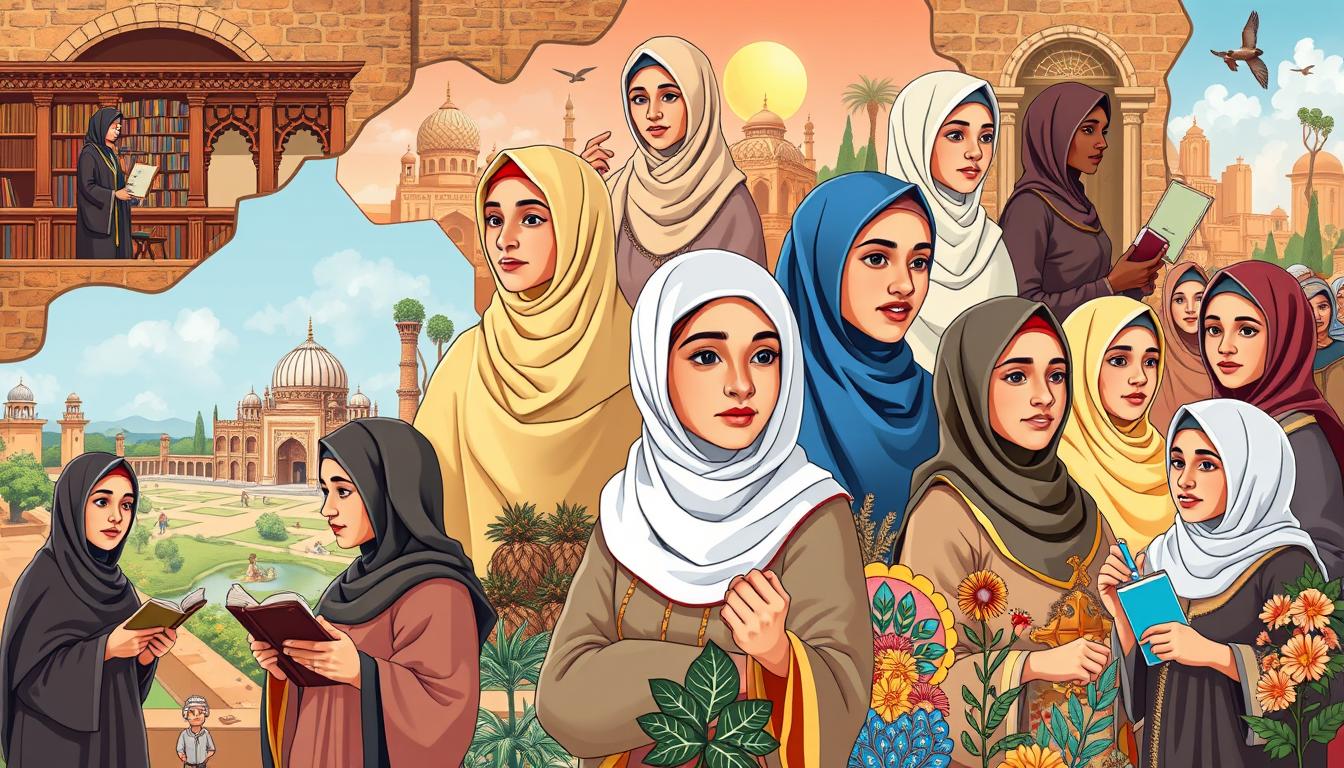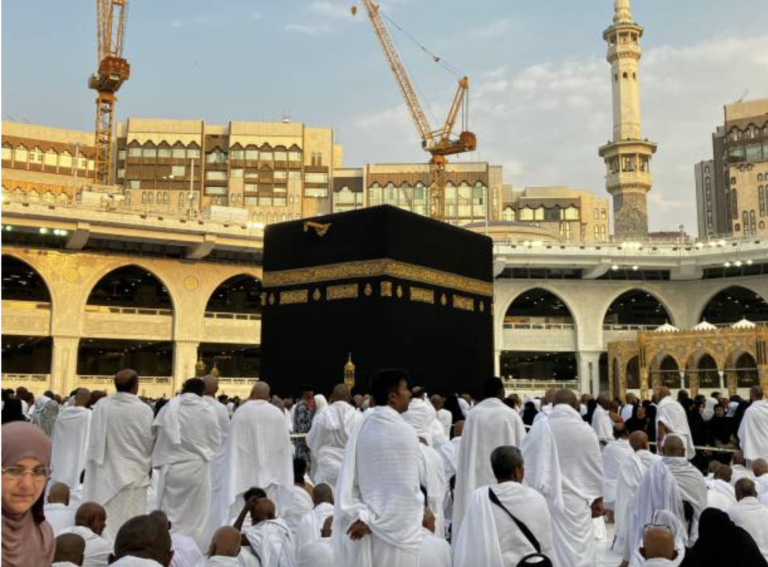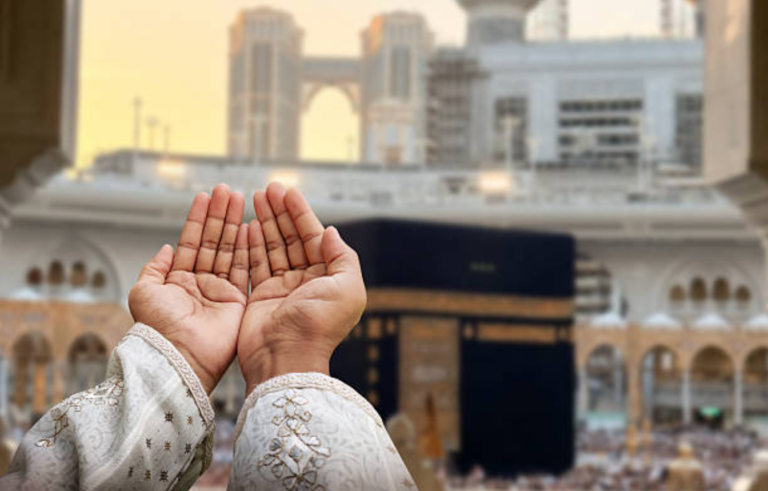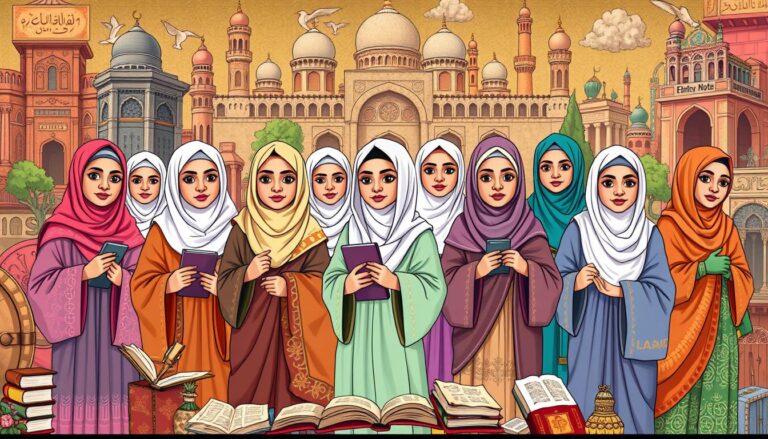How Muslim Women Have Shaped Society Through the Ages
Have you ever thought about the hidden role of Muslim women in history? Their work often goes unseen, yet it has deeply influenced society. From the start of Islam to today, Muslim women have shaped many aspects of our world.
One example is Fatima al-Fihri, who founded al-Qarawiyin University in Morocco in 859 CE. This shows the long history of female scholarship in Islam.
In politics and social work, Muslim women have made a big impact. In Egypt, women have played key roles in revolutions. Today, they are also making strides in journalism, with 250 women in the Journalists’ Union in Egypt.
The Quran teaches that men and women are equal in God’s eyes. This belief has given Muslim women the power to fight for their rights. They have won the right to own property, get an education, and make their own choices.
Key Takeaways
- Muslim women have founded educational institutions and promoted scholarship
- Female participation in politics and journalism is growing in Muslim countries
- Islam grants women rights in property ownership, education, and personal autonomy
- The Quran emphasizes gender equality in the eyes of God
- Muslim women’s contributions span various fields including science, literature, and social reform
The Historical Significance of Muslim Women in Society
Muslim women have been key in shaping Islamic civilization since its start. They have made big contributions in many areas, breaking down stereotypes. Their impact on society is clear, showing their power beyond just the home.
Early Contributions to Islamic Civilization
Women close to the Prophet were important in Islamic history. Aisha, for instance, wrote 242 Hadiths, more than Ali’s 29. This shows how crucial women were in keeping and sharing Islamic knowledge.
Breaking Stereotypes and Misconceptions
Muslim women have held important roles in history, not just at home. In the 17th century Ottoman Empire, women ruled as “sultans.” A’shia even led troops in battle against the fourth Caliph in AD 656. These examples show women’s political power in Islam.
The Role of Women in Shaping Islamic Culture
Muslim women’s influence on culture is seen in many historical books. Over 70 books talk about their roles in society, showing more than just common history. Salah ed-Din al-Munajid found over seventy biographies of women, written by famous scholars.
- Until 1882, women in England lost property rights when they married, but Muslim women kept theirs.
- Women from all walks of life have made their mark in society.
- Dress codes and veiling have changed across different classes and societies.
Despite their big contributions, Muslim women still face challenges today. They struggle for equal rights in politics, economy, and culture. This shows the ongoing battle between tradition, religion, and progress in the Muslim world.
Pioneering Muslim Women in Religious Leadership
Muslim women have shaped Islamic thought for centuries. They’ve made big contributions from early times to today. Many have become influential scholars and leaders.
Influential Female Scholars and Theologians
Women have been key in Islamic history. Aisha, Prophet Muhammad’s wife, was a major scholar. She added over 2,000 hadith to Islamic texts.
Women’s Role in Preserving Islamic Knowledge
Recently, Muslims have seen a rise in speculative theology. This has led to debates on interpreting religion. Muslim women scholars are leading this, offering new views on old texts.
Contemporary Female Religious Leaders
Today, Muslim women are making a big impact. In India, they’re leading campaigns for their rights in religious spaces. They manage mosques, perform marriages, and make legal decisions based on Islamic law.
“We’re asserting women’s existence in the sphere of worship,” one activist stated, highlighting the growing movement to reclaim women’s places in major religious roles.
More Muslim women are entering academia and religious leadership. They’re changing Islamic scholarship and practice. Their work is key in tackling modern challenges and promoting a more inclusive Islam.
Muslim Women’s Contributions to Politics and Governance
Muslim women have been making big strides in politics and governance for centuries. They have left their mark on many countries, from ancient times to today. These women have changed the political scene in many ways.
In the past, Shajarat al-Durr briefly ruled as sultan in Mamluk Egypt. The Ottoman Empire also had a “sultanate of women” in the 17th century. These early achievements set the stage for future Muslim women leaders.
Today, Muslim-majority countries are seeing more women in politics. Bangladesh has had a female leader since 1991, with Khaleda Zia and Sheikh Hasina taking turns. Countries like Kosovo, Kyrgyzstan, Senegal, Turkey, Indonesia, and Pakistan also have women in high government roles.
But, there are still hurdles to overcome. The Middle East and North Africa (MENA) region has a low rate of women in politics, at 18%. Countries like Qatar and Yemen have no women in their national legislatures.
Sudan is a bright spot, with 30.5% of seats in national and state legislatures held by women. This progress is thanks to the Sudan Women’s Union, founded in 1952. It fought for women’s right to vote and participate in politics.
“A woman can be a leader, a head of state, a minister.” – Hasan al-Turabi, Sudanese Islamist leader
Muslim women are breaking down barriers in politics and inspiring others. Their success shows the huge impact women can have in shaping their societies. They are paving the way for future generations of leaders.
The Impact of Muslim Women on Education and Literacy
Muslim women have greatly influenced education and literacy. They have overcome many obstacles to make a big impact.
Historical Examples of Female Educators
In early Islamic history, women led in education. Fatimah Al-Fihriyyah founded the Qarawiyyin University in Fez. It’s one of the oldest schools still open today.
Women like Hafsa Sultan and Nurbanu Sultan also made a difference. They built mosques with schools and libraries.
Promoting Education for Girls and Women
For a long time, Muslim women have worked to get more education. In the 10th century, many women could read. This was thanks to the Prophet Muhammad, who valued education.
Modern Muslim Women in Academia
Today, Muslim women in academia are making a mark. By 2013, nearly 60% of Saudi students in American universities were women. This shows how Muslim women are breaking barriers in education.
“Education is not a privilege, it’s a right for every Muslim woman.”
Even with progress, challenges still exist. Literacy and education for girls and women in some countries are behind global standards. But, the history of Muslim women in education inspires ongoing efforts to close this gap.
How Muslim Women Have Shaped Society Through the Ages
Muslim women have made a big impact on society for centuries. They played key roles in spreading religious knowledge from the start of Islam. A’isha, Muhammad’s wife, helped shape Islamic teachings through her work in Hadith literature.
In politics, Muslim women have been pioneers. Huda Shaarawi led Egypt’s fight for women’s rights in the 20th century. Her efforts inspired leaders like Benazir Bhutto of Pakistan and Megawati Sukarnoputri of Indonesia.
Muslim women have also made strides in economics and law. They could own property and inherit wealth, setting a precedent for their time. This was ahead of many Western societies, where women’s rights were limited until the late 19th century.
“Man and woman were created of a single soul.”
This Quranic verse highlights the spiritual equality of men and women in Islam. It has motivated many Muslim women to seek education and leadership. Today, we see more women in parliaments in Muslim-majority countries, with Morocco aiming for 25% female representation.
Muslim women have also left a mark on art and culture. In the 8th century, Rabia of Basra introduced Sufism, influencing Islamic mysticism for centuries. They continue to enrich literature, visual arts, and music, challenging stereotypes and adding to global culture.
Muslim Women’s Influence on Art, Literature, and Culture
Muslim women have made a lasting impact on art, literature, and culture. Their work spans centuries and influences society today. They have pushed boundaries and defied stereotypes through their art and writing.
Female Poets and Writers in Islamic History
In 11th-century Cordoba, Walladah bint Mustakfi, a noblewoman and poet, hosted literary salons. These events became cultural centers. Qiyan, women slaves, also made important literary contributions, adding to the rich tapestry of Islamic literature.
Contributions to Visual Arts and Architecture
Muslim women have also left their mark on visual arts and architecture. Though less documented, their work includes intricate designs and beautiful textiles. They have influenced architectural styles, showing the diversity of Islamic art.
Muslim Women’s Impact on Music and Performing Arts
In music, Muslim women have found their voice. Umm Kulthum, a legendary figure, mesmerized audiences with her voice and performances. Her legacy continues to inspire artists across generations.
“Art is the mirror of a culture and its worldviews.” – Maryam Mirzakhani, first woman to win the Fields Medal in mathematics
Muslim women keep shaping our cultural landscape. They challenge norms and create new stories. Their art and writing are powerful tools for change and understanding.
The Role of Muslim Women in Social Activism and Reform
Muslim women have been leading the charge for change for many years. They have made a big impact, from the streets of Beirut to universities. Their dedication to justice and equality has shaped history.
These women are now playing bigger roles in education and work. This change has brought about new roles and ideas about gender. For example, in Morocco, a 2004 law made husbands and wives equal in family matters.
Leaders like Dahlia Ziada and Wahija al Huwaiter are leading the fight for human rights. Ziada started her activism at 8, inspired by her life. Al Huwaiter used social media to speak out for women’s rights, despite government limits.
“We are not just fighting for our rights, but for the rights of future generations,” says Ziada, reflecting the spirit of Muslim women’s social activism.
Groups like the Women’s Learning Partnership have helped change family laws in Algeria, Tunisia, and Morocco. Their work shows how Muslim women can bring about big changes together.
But, there are still hurdles to overcome. Many interpretations of Islamic texts are influenced by old, patriarchal views. Yet, more scholars are finding ways to interpret the Qur’an that are fair to everyone.
The fight for equality by Muslim women is ongoing. Each new generation adds to the progress made by the last. Their strength and willpower are creating a fairer world for everyone.
Muslim Women’s Contributions to Science and Medicine
Muslim women have been making big strides in science and medicine for centuries. Their work shows how empowered Muslim women are in many fields.
Historical Female Scientists and Physicians
In Islamic history, women were key in scientific progress. Mariam al-Ijliya, a 10th-century astronomer, improved the astrolabe. This tool was crucial for navigation and astronomy.
Fatima Bint Muhammad al-Fihriya al-Qurashiya founded Al-Qarawiyyin in 859 AD. It’s the oldest university still open today. It teaches Islamic sciences, languages, and modern subjects.
Modern Muslim Women in STEM Fields
Today, Muslim women are still pushing boundaries in science and technology. The International Society of Muslim Women in Science has 300 members from 31 countries. Hayat Al Sindi became the first female member of Saudi Arabia’s Consultative Assembly.
In 2006, Anousheh Ansari became the first female private space explorer. Her achievement is a testament to their determination.
Breaking Barriers in Male-Dominated Scientific Disciplines
Muslim women are overcoming stereotypes in male-dominated fields. Burçin Mutlu-Pakdil found a rare galaxy named after her. Bedour al-Maghrabi won awards for her medical inventions.
“The contributions of Muslim women to science and medicine are vast and often overlooked. It’s time to recognize and celebrate their achievements.”
Despite their achievements, Muslim women face a challenge in being recognized. A survey showed a gap in STEM textbooks and literature. It’s important to inspire more Muslim women in science.
The Evolution of Muslim Women’s Rights and Empowerment
Muslim women’s rights have made big strides over time. Islamic teachings gave women rights, but culture often blocked them. Now, Muslim women are pushing past barriers and claiming their place in society.
In recent years, Muslim women have achieved a lot. Shatu Garko became the first hijabi Miss Nigeria from Kano. She broke stereotypes and inspired many. This is similar to Shaffa’u’s role in Medina under Caliph Umar bn Khattab, showing women’s leadership in early Islam.
Education has been crucial for Muslim women’s empowerment. They’re studying at Islamic universities and seminaries. This lets them understand religious texts and challenge old views held by men.
The UN’s Global Education First Initiative promotes transformative education at the heart of social, political, and development agendas.
Muslim women are also excelling in academia and activism. Scholars like Amina Wadud have reinterpreted the Qur’an from a female perspective. Islamic feminism, which started in the 1990s, aims to improve women’s rights and equality by reforming Islamic family law.
Yet, challenges persist. Many Muslim-majority countries face gender inequality. The battle for Muslim women’s empowerment goes on, with activists striving for equal rights and chances for everyone.
Conclusion
Muslim women have made a huge impact on society. From the start of Islam to today, they’ve changed many areas like religion, politics, and education. They’ve always pushed for more rights and chances, even when it’s hard.
Studies show that Muslim women still face big challenges for equality. In places like Bosnia Herzegovina, women are trying to mix their Islamic beliefs with feminism. This is important because many Muslim countries have big gaps in gender equality.
It’s important to know about Muslim women’s past and present roles. This helps us understand Islamic civilization better. It also helps fight for gender equality in Muslim societies. By doing this, we can help the economy grow too. The IMF says we could see a big increase in GDP in countries like the UAE and Egypt.
Source Links
- THE STATUS OF WOMEN
- Women in Islam
- Women in Islam
- Global Connections . Roles of Women
- Women in Muslim History: Traditional Perspectives and New Strategies – TeachMideast
- Chapter 4: Women In Society
- Introduction: The New Voices of Muslim Women Theologians
- Women Leadership, Culture, and Islam: Female Voices from Jordan – Journal of Business Ethics
- Muslim Women Political Leaders and Electoral Participation in Muslim-Majority Countries
- An increasing number of Muslim women in politics: A step towards complementarity, not equality
- Women in Islamic Societies: A Selected Review of Social Scientific Literature
- “Islam and Educational Equality for Muslim Women”
- Women and Education in the Historical Muslim World
- Female Education: A View from Early Islam
- Women in Islam
- Women in Islamic Societies: Rights, Roles, and Contributions | Women and World History Class Notes | Fiveable
- Unimagining Muslim Women – The Spurious Art of Representation | Amaliah
- Women in Islam | Islamic World Class Notes | Fiveable
- Five things you need to know about women in Islam: Implications for advancing women’s rights in the Middle East
- Reformist Women Thinkers in the Islamic World
- Muslim women in science and technology
- IWD: Muslim women who have transformed the field of science – Muslim Engagement and Development
- Women of Science, Medicine and Management – Muslim Heritage
- Muslim Women and Contemporary Challenges
- Women and the Qur’an: Feminist Interpretive Authority?
- GENDER, RELIGION AND LAW IN MUSLIM SOCIETIES — Center for the Study of Social Difference
- Muslim Women’s Religious and Feminist Identities: A Study of Muslim Feminism in the Bosnian Context
- The case for gender equality in the Muslim world







